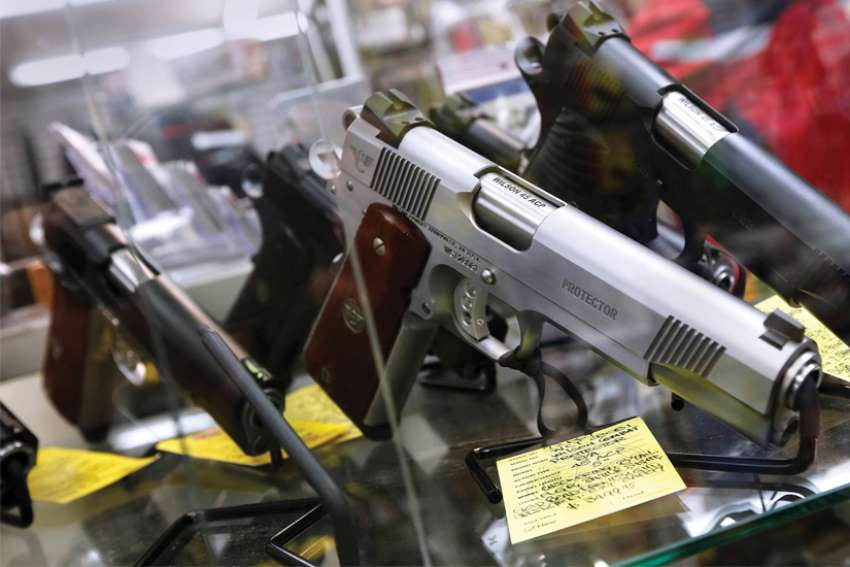Besides the national freeze on handguns, Bill C-21 seeks to revoke firearm licenses from people involved in domestic violence or criminal harassment, increase penalties for gun smuggling and trafficking and implement a “red flag” law that requires those deemed dangerous to surrender their firearms, among other measures.
Recent horrific mass shootings south of the border, plus our own burgeoning problem with gun-related crimes, makes this legislation particularly urgent and timely.
When announcing Bill C-21, Prime Minister Justin Trudeau put forth the strongest argument when he said: “Other than using firearms for sport shooting and hunting, there is no reason anyone in Canada should need guns in their everyday lives.”
Sadly, guns are a part of the everyday lives of most Americans. The Geneva-based gun research group Small Arms Survey found that the U.S. had 120.5 guns per 100 residents in 2017.
The war-torn, Middle Eastern country Yemen came a distant second with 52.8 guns per 100 residents. Americans accounted for over 45 per cent of the 857 million firearms that civilians world-wide owned at the end of 2017.
In the U.S., national measures to regulate handgun sales and possession are very limited, with local firearms measures varying widely from state to state. Attempts to clamp down on gun sales and place conditions on ownership are met with bitter opposition from politicians and citizens alike.
What is striking is a vocal passion for “the right of the people to keep and bear Arms,” as stated in the Second Amendment of the U.S. Constitution.
Gun ownership has become deeply embedded in the American identity. Witness the presence of American flags at National Rifle Association conventions and other gun shows. Not to own a gun is decidedly un-American in many quarters.
Such sentiment is coupled with an overall distrust in government. Generally speaking, American society is less open to government regulation of the economy, environment, health care and other areas compared to a country like Canada.
Many Americans believe that government regulations restrict their individual freedoms or, in extreme cases, lay the groundwork for nefarious, secretive government agendas.
Distrust in the government, an individualist world view, a desire to be patriotic and high crime rates including more and more mass shootings all combine in a perfect storm to compel most Americans to purchase — and use — guns to protect themselves and their families.
Tragically, people disenchanted with their individual fate or wishing to act out their ideological stances also use guns to make their point.
Lest we become too complacent, the same forces are starting to take root in Canada.
Opposition to COVID-19 restrictions fanned the flames of a small but vocal group of Canadians who hold a generalized distrust of government. Thanks to the trucker protests, the Canadian flag flying on some vehicles has come to symbolize the view of governments restricting individual freedoms.
If a society loses its collective vision of providing for the common good and supporting its weaker and more vulnerable members, and if people lose faith in structures meant to protect all, then eventually people may feel the need to arm themselves for protection.
Thankfully, gun ownership is not part of the Canadian identity at this point, however, there is danger of gun restrictions being swept up into the general discontent with government.
What we do have is a rise in gun-related crimes. For instance, according to a My 27 Statistics Canada report, the proportion of homicides involving a firearm rose from 26 per cent of all homicides in 2013 to 37 per cent in 2020.
Another StatsCan report has found that violent offenses involving guns have increased 81 per cent since 2009, one in three homicides in Canada are firearms-related and 47 per cent of Canadians feel gun violence is a threat to their community.
In the Small Arms Survey mentioned earlier, among the group of highly developed countries, Canada was closest to the U.S., with 34.7 guns per 100 residents in 2017.
It’s time to reverse these trends. The passage of Bill C-21 into law will hopefully reduce the number of handguns and other firearms in circulation.
With fewer firearms, we would be in a stronger position to protect our citizens from mass shooting incidents and gun-related crimes in general. We also need a culture shift in which we reject the American gun culture that in some ways “glamorizes” guns to a culture that sees guns more as a threat to the common good than protection for individual citizens.
(Majtenyi is a public relations officer specializing in research at an Ontario university.)


